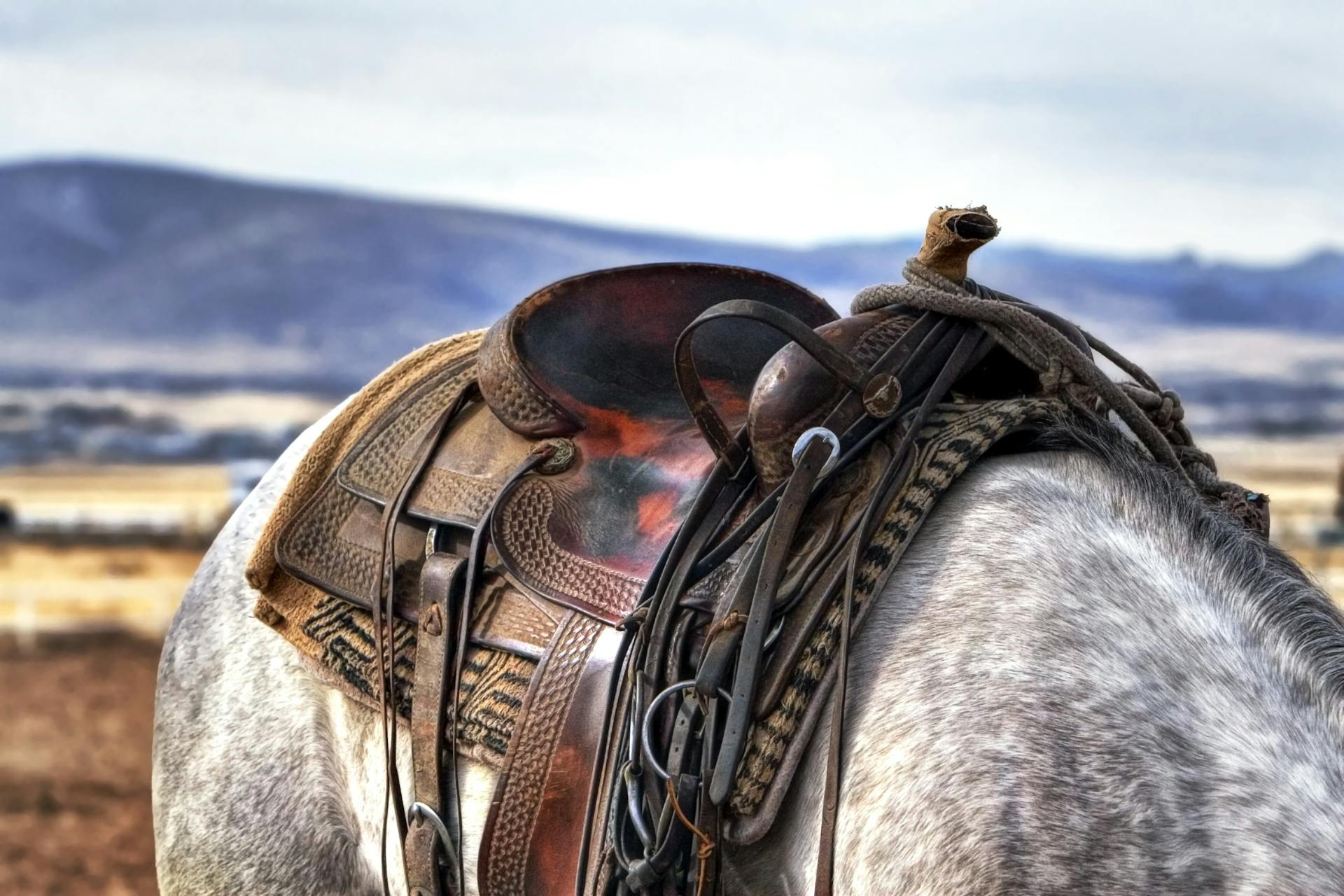
Horse insurance is a vital investment for horse owners, providing financial protection against unexpected veterinary expenses, accidents, and other unforeseen events.
Liability coverage is a crucial aspect of horse insurance, as it protects owners from lawsuits if their horse causes injury or damage to others.
Accidents can happen at any moment, and horse insurance helps cover the cost of veterinary care, including surgery, hospitalization, and medication, which can be extremely high.
The average cost of a veterinary bill for a horse can range from $1,000 to $5,000 or more, depending on the severity of the injury or illness.
Horse owners who don't have insurance may be forced to make difficult decisions about their horse's care, including whether to euthanize them due to financial constraints.
Check this out: Vet Business Insurance
What is Covered
Horse insurance can provide financial protection in the event of your horse's death or injury.
Accidents, injury, sickness, disease, and even theft are typically covered by equine mortality insurance. This includes death due to any accident, illness, disease, or if the veterinarian deems it necessary to euthanize the horse.
Here's an interesting read: Does Health Insurance Cover Death
Emergency colic surgery is covered up to $3,500 with no deductible. This can be a lifesaver if your horse suddenly becomes ill and requires urgent medical attention.
Theft of a horse is also covered, as long as a police report is filed and the horse is not recovered within 90 days.
Major medical expenses are covered, including veterinary medical care or surgery as a result of accidents, injury, sickness, or disease. This can be a significant cost, and insurance can help alleviate some of the financial burden.
Surgical expenses are also covered, including equine surgeries that are expensive and may not be covered by regular veterinary care.
Loss of use is covered, so that you don't sustain major financial losses if a horse is not fit for its first use due to accident, injury, sickness, or death.
The following are some specific benefits you may want to consider:
- Colic surgery expense: Specifically covers colic surgery expenses for your horse.
- Newly purchased horse: Coverage can extend protection to a new horse you buy.
- Increased mare valuation: Raises coverage limits for a mare that is pregnant to include cost of stud fee/embryo.
What is Not Covered
Horse insurance typically doesn't cover pre-existing conditions.
You'll need to carefully review the policy to understand what's considered a pre-existing condition.
Horse insurance usually doesn't cover damage caused by neglect or poor care.
If you're not providing proper care for your horse, the insurance won't be able to help you.
Horse insurance typically doesn't cover losses due to abandonment or sale of the horse.
This means if you decide to sell or abandon your horse, you won't be able to claim against the insurance policy.
A fresh viewpoint: Why Doesn't My Insurance Cover Wegovy
Optional Coverages Can Be Added
Optional coverages can be added to your equine insurance policy as needed. These additional coverages can provide extra protection for your horse and peace of mind for you.
One optional coverage is Colic surgery expense, which specifically covers colic surgery expenses for your horse. This can be a lifesaver in an emergency situation.
Another optional coverage is Newly purchased horse, which allows you to extend protection to a new horse you buy. This can provide continuity of coverage and ensure your new horse is protected from the start.
For more insights, see: New Product Insurance
Increased mare valuation is also an optional coverage that raises coverage limits for a mare that is pregnant to include the cost of stud fee/embryo. This can provide additional financial protection for your mare and her future foal.
Some other optional coverages include Surgical Only Coverage, Colic Only Coverage, Loss of Use, and Stallion Accident/Sickness/Disease. These coverages can be added to your policy to provide extra protection for your horse in various situations.
Here are some of the optional coverages you can add to your equine insurance policy:
- Colic surgery expense: Specifically covers colic surgery expenses for your horse.
- Newly purchased horse: Coverage can extend protection to a new horse you buy.
- Increased mare valuation: Raises coverage limits for a mare that is pregnant to include cost of stud fee/embryo.
Liability and Loss
Liability insurance is a must-have for horse owners, as it protects you from financial loss in case your horse causes damage or injury to someone or something else.
Your liability insurance can cover medical or repair costs if your horse accidentally injures someone or damages their property. This type of insurance is similar to car insurance, which also covers liability costs.
Discover more: What Happens If Someone Makes a False Insurance Claim
Some farm and ranch insurance policies already include liability coverage, so be sure to check your existing policy before purchasing a separate liability policy.
If you do decide to purchase a liability policy, make sure to review the coverage options carefully to ensure you're protected in case of an accident.
Mortality
Mortality is a crucial aspect of equine insurance, and it's essential to understand what's covered. Equine mortality insurance reimburses you the insured value of your horse for death due to accident, injury, illness, disease, or humane destruction.
Equine mortality insurance is available for horses between the ages of 31 days and 20 years old. This type of insurance is designed to cover the value of your horse in the event of a covered loss.
A broad range of perils are typically included in equine mortality insurance, such as accidents, injury, sickness, disease, and even theft. Coverage also provides benefits like major medical expenses, surgical expenses, and loss of use.
Additional reading: Equine Major Medical Insurance

Here's a breakdown of what's typically covered under equine mortality insurance:
- Death due to accident, injury, illness, disease, or humane destruction
- Theft of a horse if a police report is filed and the horse is not recovered within 90 days
- Up to $3,500 worth of Emergency Colic Surgery coverage with no deductible
- Transit by aircraft or land vehicle within the United States and Canada
Loss of Use
Loss of Use is a type of insurance that can be a lifesaver for horse owners. It's designed to reimburse you for a percentage of your horse's value if they're unable to perform their intended use due to a non-fatal illness, accident, or injury.
Loss-of-use policies can be tailored to your specific needs, taking into account your discipline, your horse's age, and their medical history. For example, if you have a stallion used for breeding, your insurance company may reimburse you for infertility caused by an illness.
Loss-of-use insurance can be a valuable addition to your equine insurance portfolio, providing financial protection in case your horse is unable to perform their intended use. It's not just about the monetary value, but also about the emotional investment you've made in your horse.
Some examples of loss-of-use scenarios include an event horse that suffers an injury making it unable to jump, or a stallion that contracts an illness leaving him infertile. In these situations, loss-of-use insurance can help you recover some of the financial losses.
For another approach, see: Terminal Illness Insurance
Here's a breakdown of what loss-of-use insurance can cover:
Keep in mind that loss-of-use policies are usually case-by-case, so it's essential to discuss your specific situation with your insurance company.
Private Liability
As a horse owner, it's essential to consider private liability insurance to protect yourself and your property in case of an accident. Private horse owner liability covers third-party liability costs in the event of an incident.
This type of insurance can cover damages or injuries caused by your horse, including bodily harm such as kicks, bites, or being stepped on. Property damage is also covered, including vehicles, trailers, barns, fences, and stalls.
Incidents that may be covered under private liability insurance include being kicked, bitten, stepped on, or bucked off by your horse. Your property, such as a vehicle or barn, could also be damaged by your horse.
Here are some examples of incidents that may be covered:
- Kicked
- Bitten
- Stepped on
- Bucked/fallen off
Property damage can also occur, including:
- Vehicle
- Trailer
- Barn/structure
- Fence
- Stall
It's worth noting that some farm and ranch insurance policies may already offer this type of coverage, so be sure to check your existing policy before purchasing additional insurance.
Frequently Asked Questions
Does horse insurance cover vet bills?
Yes, equine medical insurance covers veterinary costs such as vet visits, surgery, and medication for illnesses or injuries. However, policies typically have limits and deductibles that apply to each incident and per horse per year.
Featured Images: pexels.com


